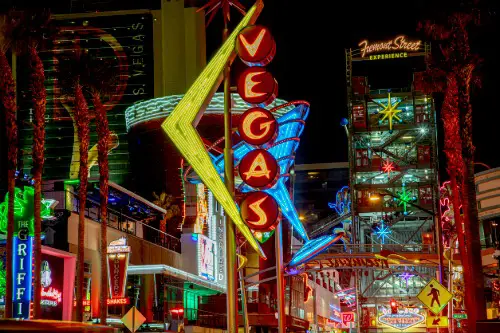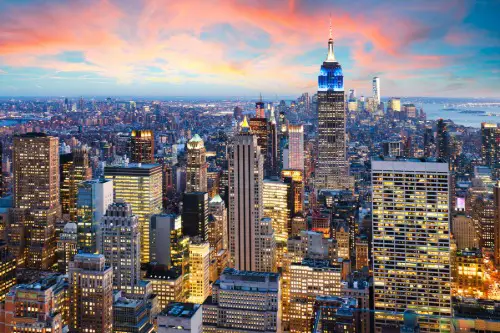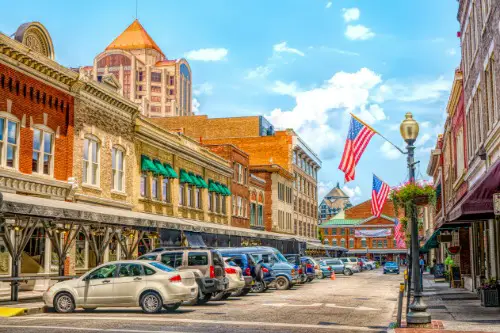1. Nevada

Nevada’s hot climate makes air conditioning a necessity, but the state is pushing for more efficient alternatives. Laws are already in place requiring appliances, including AC units, to meet strict efficiency standards. Utility companies are also being pressured to offer incentives for energy-efficient cooling systems. As a result, older and less efficient AC units could soon be phased out, according to the Department of Energy.
Additionally, Nevada is investing in smart grid technology to better manage electricity demand. This could lead to time-based pricing, making traditional AC units more expensive to operate. Some cities, like Las Vegas, are exploring innovative cooling techniques to reduce the heat island effect. If these policies gain traction, Nevada could be on track to restrict traditional air conditioning in favor of greener options.
2. California

California has a long history of aggressive environmental policies, and air conditioning is next on the list, according to the California Air Resources Board. The state has already proposed regulations requiring homeowners to replace broken AC units with heat pumps, a more energy-efficient alternative. Cities like Los Angeles and San Francisco are also cracking down on high-energy appliances to meet ambitious climate goals. Given California’s push for carbon neutrality by 2045, traditional air conditioning could soon be on the chopping block.
On top of that, the California Energy Commission has been updating building codes to favor energy-efficient cooling solutions. The state is also investing heavily in passive cooling strategies, like reflective roofing and improved insulation. These measures reduce the need for traditional air conditioning altogether, making a phase-out more feasible. With California leading the way in climate initiatives, it wouldn’t be surprising if conventional AC units become a thing of the past.
3. Washington

Washington is another state with strict energy efficiency mandates, and air conditioning is under scrutiny, according to WA.gov. Recent updates to the state’s energy code require new buildings to install heat pumps instead of conventional AC systems. This move aligns with Washington’s commitment to cutting carbon emissions and promoting clean energy alternatives. As these regulations expand, older cooling systems may face tighter restrictions or eventual bans.
Beyond building codes, Washington is investing in sustainable infrastructure that naturally reduces the need for air conditioning. Urban planning efforts include increased tree cover, green roofs, and better building insulation to keep spaces cooler. These strategies could pave the way for an outright phase-out of traditional AC units in the coming years. With Washington consistently ranking among the most environmentally progressive states, such a move wouldn’t be surprising.
4. New York

New York is making aggressive moves toward cutting emissions, and air conditioning could be a future target, according to NYC.gov. The state has already passed laws that hold corporations accountable for carbon pollution and promote electrification of buildings. There’s a growing push for heat pumps, which are seen as a cleaner alternative to traditional AC units. If current trends continue, stricter regulations on conventional cooling systems are likely in the near future.
New York City, in particular, is setting ambitious goals for energy efficiency in buildings. Landlords are being incentivized—or required—to upgrade HVAC systems to more sustainable models. The city has also introduced building emission limits, which could make traditional AC units too costly for many businesses. With pressure mounting to cut energy use, traditional air conditioning could soon be phased out.
5. Massachusetts

Massachusetts is one of the top states for energy efficiency, and air conditioning is a big focus, according to Mass.gov. The state’s “Stretch Energy Code” encourages municipalities to adopt stricter efficiency standards, including the promotion of heat pumps. As more towns and cities adopt these rules, traditional air conditioning units could become obsolete. With Massachusetts aiming for a 50% reduction in emissions by 2040, this shift is only expected to accelerate.
State officials are also considering new policies that incentivize energy-efficient cooling methods. Programs offering rebates for heat pumps and energy-saving upgrades are gaining traction. At the same time, older and less efficient AC units are being phased out through regulatory pressure. If these trends continue, Massachusetts could be one of the first states to move away from conventional air conditioning.
6. Oregon

Oregon is known for its strict environmental policies, and air conditioning is increasingly in the spotlight. Proposed regulations are pushing for more efficient cooling systems, particularly in new construction. The state is also considering rules that would make it harder for utilities to pass high-energy costs to consumers. These policies could discourage the use of traditional AC units and promote greener alternatives.
At the same time, Oregon is investing in infrastructure that reduces the need for air conditioning altogether. Initiatives like energy-efficient building materials, improved insulation, and increased tree cover are gaining momentum. Some cities are even experimenting with cool pavements and reflective surfaces to lower urban temperatures. If Oregon continues on this path, traditional AC units may become a thing of the past.
7. Virginia

Virginia has set ambitious clean energy goals, which could put air conditioning under regulatory pressure. The state’s Clean Economy Act requires a transition to 100% renewable electricity by 2045. As part of this shift, energy efficiency measures—including alternatives to conventional AC—are becoming a major focus. Heat pumps and passive cooling solutions are already being pushed as replacements.
In addition to state-level policies, local governments are tightening energy codes. New building regulations require better insulation and energy-efficient cooling technologies. Cities like Richmond and Arlington are exploring ways to reduce reliance on energy-hungry HVAC systems. If Virginia keeps up this momentum, a move away from traditional air conditioning could be on the horizon.
8. Colorado

Colorado has recently introduced new energy efficiency laws that could impact air conditioning. The state is requiring many appliances to meet stricter efficiency standards, which could push out older AC models. At the same time, officials are encouraging homeowners and businesses to switch to heat pumps. With extreme temperature fluctuations, energy-efficient cooling is becoming a legislative priority.
Beyond regulations, Colorado is investing in green building initiatives. The state has launched programs to retrofit older homes with better insulation and cooling alternatives. Urban planning efforts also focus on reducing heat absorption in cities to lessen reliance on air conditioning. If these policies continue to evolve, traditional AC units may soon be outdated.
9. Hawaii

Hawaii has long been a leader in renewable energy, and air conditioning is a growing concern. Given the state’s tropical climate, cooling systems account for a huge portion of energy consumption. To combat this, Hawaii has introduced strict energy efficiency standards for appliances, including AC units. Heat pumps and other sustainable alternatives are being encouraged as replacements.
At the same time, the state is focusing on reducing overall energy demand. New construction guidelines emphasize natural cooling techniques, such as better ventilation and shading. Some hotels and resorts are already adopting passive cooling strategies to cut down on energy use. If these trends continue, Hawaii could be one of the first places to limit traditional air conditioning.


